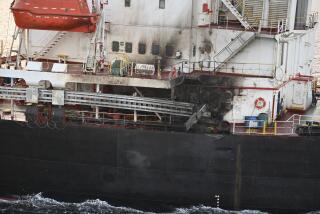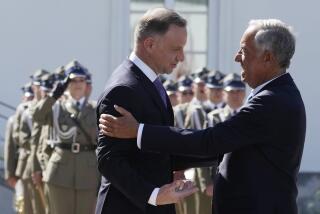Belgium Drops Condition for Missile Deployment
- Share via
BRUSSELS — Premier Wilfried Martens said Thursday that Belgium will deploy cruise missiles and will announce by the end of March a timetable for the arrival of the first 16 weapons. Belgium is to deploy 48 missiles by late 1987.
Martens said, “We have arrived at a point where we have to carry out” the 1979 decision of the North Atlantic Treaty Organization to deploy 572 U.S. cruise and Pershing 2 missiles in five West European nations, including Belgium. They would be the first nuclear arms to be installed in this nation of 10 million people.
In a statement here that amplified remarks that he made earlier this week in Washington, Martens said his government is no longer conducting an evaluation of East-West arms talks, a condition Belgium had placed on missile deployment. Martens called this a radical change in nuclear arms policy.
Martens’ center-right government had said that a decision to start deploying the first missiles hinged on progress in U.S.-Soviet arms talks.
“NATO can be happy that we will decide (on a deployment schedule) before the end of March, and the period of pure evaluation has been transformed into a firm decision (to deploy) by the Belgian government,” he said.
Martens said that his Cabinet will fix the timetable “in agreement with the (NATO) allies.” Foreign Minister Leo Tindemans will contact Lord Carrington, the NATO secretary general, and visit allied capitals in the next few weeks to seek a consensus on the timing, he added.
With such a commitment, however, Belgium will not be able to meet NATO’s schedule, which called for the first group of 16 cruise missiles to be installed by mid-March at Florennes air base, 40 miles south of here. The second group of 32 missiles is to be deployed in late 1987.
Martens said that preparations for the missiles will continue at Florennes, although the arrival date of the first missiles is still unknown. About 700 American military personnel are at the base to facilitate deployment.
A U.S. official at NATO headquarters, who spoke on condition of anonymity, would only say: “The Belgian missiles position appears to be evolving. We want to study his (Martens’) remarks very closely.”
Confusion After Meeting Martens spoke a few hours after returning from the United States, where he discussed the missile issue with President Reagan. There had been considerable confusion after his meeting with Reagan about Belgium’s attitude toward the missiles.
In Washington, White House spokesman Robert Sims, asked about Martens’ remarks, said: “Nothing has changed in our view. We expect Belgium to live up to commitments it has made as a member of NATO.”
At his press conference, Martens underscored Belgium’s allegiance to the alliance’s decision to deploy the missiles as a counter to the deployment of hundreds of medium-range Soviet SS-20 missiles.
Deployment Variables He said that if Moscow does not agree to significantly cut its arsenal of SS-20s, now totaling 396, Belgium will deploy all 48 cruise missiles.
If there is partial success at the new arms talks, Martens said, Belgium will deploy a number of cruise missiles that corresponds to the results of those negotiations.
Martens’ coalition government of Christian Democrats and rightist Liberals came to office in 1981. It faces December elections in which opposition Socialists are expected to gain at the expense of Martens’ own Christian Democrats.
Socialist leaders have said in recent days that if they join the next coalition government, they will try to remove any missiles installed under the Martens regime.
More to Read
Sign up for Essential California
The most important California stories and recommendations in your inbox every morning.
You may occasionally receive promotional content from the Los Angeles Times.












